

Economics. Greece is one of the most important civilizations in our history even though it may not seem so important in today's society.
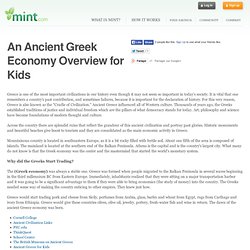
It is vital that one remembers a country's past contribution, and sometimes failures, because it is important for the declaration of history. For this very reason, Greece is also known as the "Cradle of Civilization. " Ancient Greece influenced all of Western culture. Thousands of years ago, the Greeks established traditions of justice and individual freedom which are the pillars of what democracy stands for today.
Art, philosophy and science have become foundations of modern thought and culture. Across the country there are splendid ruins that reflect the grandeur of this ancient civilization and portray past glories. Mountainous country is located in southeastern Europe, as it is a bit rocky filled with fertile soil. Why did the Greeks Start Trading? The (Greek economy) was always a stable one. Minting Coins Being Conquered by the Romans By Kelly Anderson. Economy. Interactions. Lecture Notes Mediterranean Civilizations, ca. 2000 BC-AD 500 Introduction to Classical Civilizations: Hellenic (or Greek) Civilization (ca. 1000-4th century BC); Hellenistic Civilization (4th-1st Centuries BC); Roman Civilization (753 BC-AD 476).
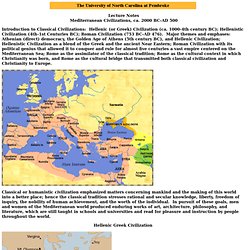
Major themes and emphases: Athenian (direct) democracy, the Golden Age of Athens (5th century BC), and Hellenic Civilization; Hellenistic Civilization as a blend of the Greek and the ancient Near Eastern; Roman Civilization with its political genius that allowed it to conquer and rule for almost five centuries a vast empire centered on the Mediterranean Sea; Rome as the assimilator of the classical tradition; Rome as the cultural context in which Christianity was born, and Rome as the cultural bridge that transmitted both classical civilization and Christianity to Europe. Hellenic Greek Civilization Map of the Greek World. The Lion's Gate at Mycenae Mycenaean Tomb Mask Combat between Menelaus and Hercules. The Greek Dark Ages, ca. 1000-800 BC. 1. 2. Interactions. More Culture. Ancient Greek Culture was the birthplace of Western civilisation about 4000 years ago.
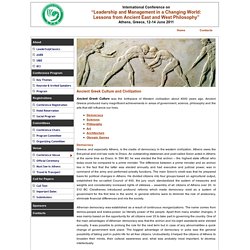
Ancient Greece produced many magnificent achievements in areas of government, science, philosophy and the arts that still influence our lives. Democracy Greece, and especially Athens, is the cradle of democracy in the western civilization. Athens owes the first penal and civil law code to Draco. An outstanding statesman and poet called Solon acted in Athens at the same time as Draco. In 594 BC he was elected the first archon – the highest state official who today could be compared to a prime minister. Athenian democracy was established as a result of continuous reorganizations. SciencesGreece has importantly influenced the Western science in many ways. Thales of Miletus (640-610 to ca 548-545 BC) had travelled widely in quest of knowledge, visiting Crete, Phoenicia, and Egypt. Pythagoras (569 to 475 BC) was the Greek philosopher and mathematician. Socrates was a classical Greek philosopher. Culture. Political. The ancient Greeks were particularly concerned with such fundamental questions as who should rule and how?
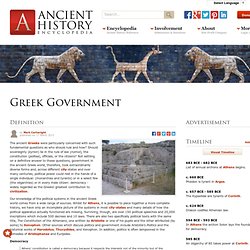
Should sovereignty (kyrion) lie in the rule of law (nomoi), the constitution (politea), officials, or the citizens? Not settling on a definitive answer to these questions, government in the ancient Greek world, therefore, took extraordinarily diverse forms and, across different city-states and over many centuries, political power could rest in the hands of a single individual: (monarchies and tyrants) or in a select few (the oligarchies) or in every male citizen: democracy - widely regarded as the Greeks' greatest contribution to civilization.
Our knowledge of the political systems in the ancient Greek world comes from a wide range of sources. Whilst for Athens, it is possible to piece together a more complete history, we have only an incomplete picture of the systems in most city-states and many details of how the political apparatus actually functioned are missing. Democracy. Political. Social. Although the male citizen, with his full legal status, right to vote, hold public office, and own property, may well have dominated Greek Society, the social groups which made up the population of a typical Greek city-state or polis were remarkably diverse.
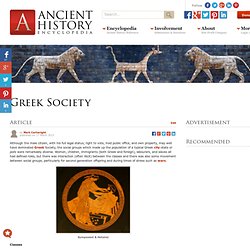
Women, children, immigrants (both Greek and foreign), labourers, and slaves all had defined roles, but there was interaction (often illicit) between the classes and there was also some movement between social groups, particularly for second generation offspring and during times of stress such as wars. Classes Although the male citizen had by far the best position in Greek society, there were different classes within this group.
Top of the social tree were the ‘best people’, the aristoi. Possessing more money than everyone else, this class could provide themselves with armour, weapons, and a horse when on military campaign. A poorer, second class of citizens existed too. A third group were the middle, business class. Women Labourers. Society.